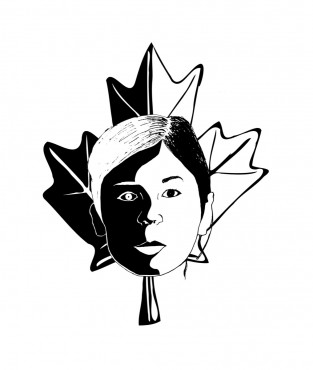
Nicholas Wong (graphic)
Sitting in a crowded lecture hall a few weeks ago, I was in the process of making a new friend. We had dutifully slogged through the get-to-know-you checklist (what’s your major, what year?), when the inevitable question popped up like a fresh fall mushroom: Where are you from?
“Kelowna,” I said.
“Oh really, you don’t look like a native speaker.”
“I know,” I kept my voice even. “But I am.”
Incredibly, he continued. “So you’re mixed.”
“Yep,” I said. Voice less even.
He smiled. “It’s really nice to see unusual looking people around.”
End of conversation (and potential friendship). I ducked my head and prayed to the almighty gods the prof would begin soon.
Exchanges like this infuriate me. I cannot count the number of times I have had strangers ask “What are you?” as though I was some sort of alien species. It happens with alarming frequency: at work, coffee shops, school—everywhere. Once, when travelling, I told a man I was from Canada. “No,” he laughed. “Where are you really from?”
To respond to the myriad of inquiries, I generally explain (calmly) that my grandmother was from China. This usually elicits an “Oh,” followed by, “so you’re half Asian.”
Now, I understand that you are curious. My hair is black and my skin has a permanent tan, but my facial features are not Asian. I have been described as looking Greek, Nepalese, Malaysian, and “like Pocahontas.” Curiosity is fine, and I’m happy to answer your questions so long as they are rooted in genuine interest and we are more than just strangers to each other. What is not okay is when a complete stranger believes it’s appropriate to share their assumptions about who I am. Assumptions that are based on appearance and formed within the first five minutes of meeting.
Brace yourself for the shock. Ready for it? Not all Canadians look white. Some of them are black, some are aboriginal, some are Hispanic, some are Asian, and some are even (God forbid) a mixture. Whew, let’s all take a moment and process that one.
Nationality is not based on appearance. Nationality is defined as the relationship between a person and a country—an intersection of where you were born, where you live, and where you consider home. For me, that is Canada.
So come on, UVic. You can do better. Let’s create a campus where students are valued for what’s inside their heads as opposed to their race, because when you meet me for the first time and all you ask about is my racial background, it sends the message that it’s all you value in me. And while half-Asians are pretty much fantastic, I like to go for a more humble approach on first impressions. So stick to that tried and true checklist. Ask about my major, my interests, and my goals. Ask me what I had for breakfast. Later, when you actually know me, feel free to ask whatever you want (I’ll probably tell you myself anyway).
In the end it’s simple. I am Canadian. So are both my parents. Don’t confuse my nationality with my ethnicity. Don’t make thoughtless assumptions and throw them around like stray ping-pong balls at a house party. If you can manage that, we’ll get along fine.






